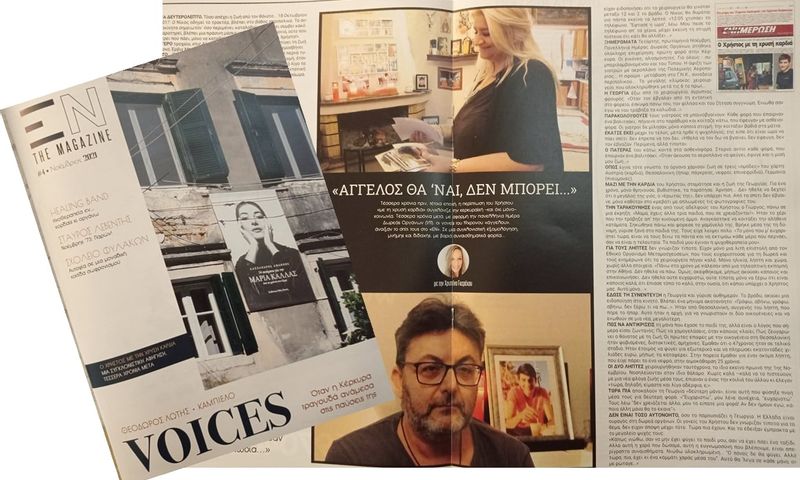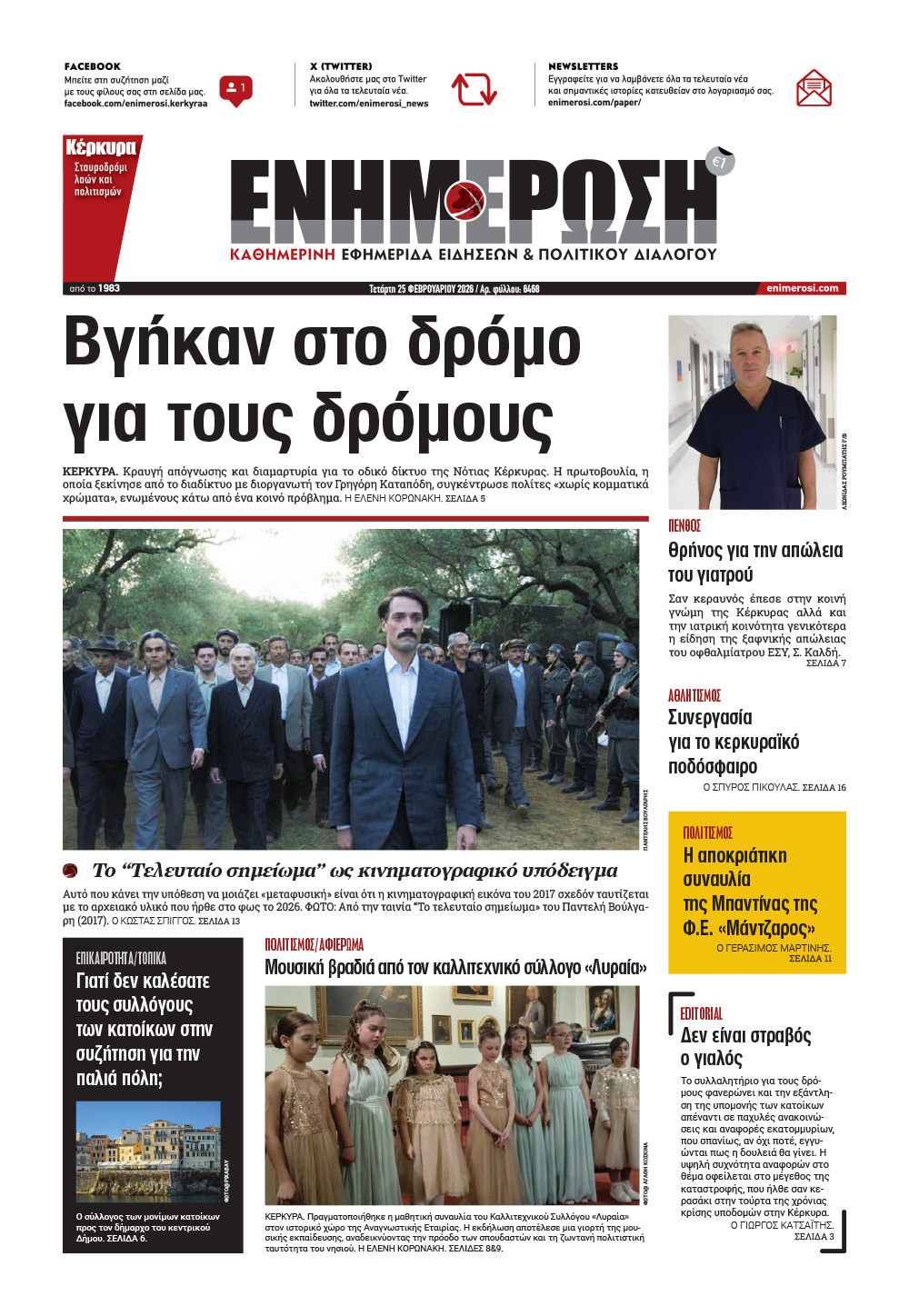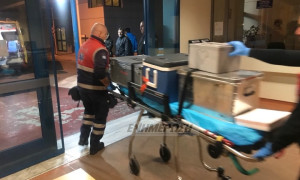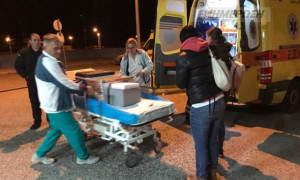The incredible story of Christos with the ‘heart of gold’

Christos Kourkoulos
31 Oct 2022
/ 22:13
CORFU. The family of the 19-year-old Christos talk about the tragic last moments and how they decided to donate their child΄s organs.
One second. That's how far life is from death. 18 October 2017. Nikos drove the tractor and saw patrol cars in the distance. The other cars had stopped and he realised that something bad had happened. He noticed a green helmet. For a moment, he lost control of the wheel. He did not even know where he was going, he just wanted to get off the tractor and run. "My child! Christos!".
17-year-old Ervin Bekiri died immediately in the road accident in Alykes, while 19-year-old Christos Kourkoulos was in critical condition.
His father happened to pass by on his way to work. "I felt it from the first moment, when I saw the children on the road. They were taken by ambulances to the hospital. After a while we heard the news. Ervin had died. Christos was taken straight to the ICU and I was told he wouldn't last more than one - two at the most - days. Everything had fallen apart."
The young man survived for two weeks in the ICU, which seemed like two centuries. His parents, Georgia and Nikos, waited for signs of recovery - even though the doctors assured them that there was no hope.
The first two days Georgia seemed lost. "At first they wouldn't let me into the ICU. When they saw that I wasn't causing trouble, they gave me permission to get in. They told us he was brain dead but the first 24 hours had passed. And the second. And as the hours went by, I kept saying maybe, maybe..."
She took a breath and continued: "In the last few days I was told about organ donation, his father was told early on. I could hear them whispering about it in the hallways. I wanted to kill them!"
They didn't even want to hear it. At first, they reacted badly. Talking to them, however, one could tell that it was not the organ donation that made them angry, but the idea of their child's death.
The father was the first one to be told. "Even though I had seen what had happened with my own eyes, I kept telling myself that he would get up. I was holding his hand and saying, darling, show me that you can hear me. Nothing. I was the first to be told, the ICU Director called me. ‘Christos will come home, don't ever say that to me again, doctor!’" Later he went and found Father Kostas to ask him. "Do it" he told him. "When I told my wife, she slapped me like never before in 30 years. I left the final decision to her, I didn't try to convince her. Georgia was the mother. If she said no, it was no."
The morning they saw his colour change they knew. Georgia wanted to discuss it with the family. She asked the eldest daughter, Evie. "Let's do it mom, I know Christos would have wanted it, that's the kind of person he was. Think of the mothers, whose children will be saved," she told her. "So, I put myself in the shoes of some mother who was told that her child had found a kidney and would live. I started thinking about it. We're going to have a beautiful ceremony. Why lose the organs, if they could give life?", said Georgia.
There was also the dream. She saw her child sad in a wheelchair. "Where do you want me to be, mother? This is my life now." The dream, her daughter's words and Christos himself were the three pieces of the puzzle that led to the decision. "Christos was a very giving, very sensitive child. Quiet, patient. We know that if we could ask him, that's what he would have said, he always wanted to help. He must be an angel now, he has to be," said his father.
The last few days he kept having heart attacks, three or four every night and they kept bringing him back. He had a strong heart, everyone was amazed. They asked the father if they had thought about it. "Time is running out. As we speak, they could call me and tell me that he's gone. Christos is not coming back," the doctor told him. They all nodded in agreement, Nikos signed.
They will never forget that night. Many people, not just the family. They had been told that the surgery would take place between 00:00 and 02:00. Nikos will always remember those minutes. "The phone rang at 00:05. It's time, I said. The phone fell from my hands, until that moment I thought something was going to change."
In the early hours of Wednesday morning on November 1st, the National Day for Organ Donation, a major operation was underway for the first time in Corfu. It was unforgettable. Doctors arrived in an Air Force plane and sped to the hospital with a police escort. A complex surgical operation, which was completed after 06:00.
Georgia stayed awake outside the operating room the whole time. "When they took him out of the ICU on the stretcher, I leaned over him, kissed him and apologised. I felt like I was the one who pulled his wires." She watched the doctors go in and out. Every time they picked up a suitcase, she would go to the window and look down, where they were leaving in ambulances. The doctors didn't speak, only at some point they looked deeply into her eyes.
She stayed there until the end. Then the psychologist came, she told her it was time to go home, she should not see him. "I wanted to see him go out, I wasn't leaving, they wouldn't let him out. I waited, but nothing happened."
His father was downstairs near the ambulances. Every time they picked up a suitcase, it was a last goodbye. "When I heard the plane leave, half my life was gone."
As it became known at the time, the organs gave life to people in Austria (heart), Thessaloniki (liver, pancreas, kidneys, adrenals) and Germany (lungs).
Along with Christos' heart, Georgia's life stopped. For a year, she only mourned, she gave up. Denial. She didn't want to accept that her eldest son, her "love" no longer existed. She didn't leave the house, she only sat on the bed with his pictures spread out.
It was one of Christos' brothers, Giorgos, that changed that. "Mom, you have three other kids that need you!" She was forced to face the truth. She stood up and put on her smile. She found the strength within herself and turned back to her children. They had missed her so much. "The only thing that makes me happy now is giving them everything and appreciating each day as if it were my last. My children became my therapy."
They knew nothing about the recipients. They only had a simple letter from the National Transplant Organisation thanking them for the donation and letting them know that the surgeries went well. Just the recipient's age and country, no other details. "I was invited to a TV show in Athens. I didn't want to go. But we thought, maybe someone would listen and get in touch. I didn't want any thanks or anything, I just wanted to know that someone is well, that our Christos still existed somewhere. That's all".
Georgia gave the interview and returned the same day. In the evening, she heard a notification on her phone. She saw an incomprehensible message: "I was writing, erasing, writing, erasing, I didn't know what to say". It was from Thessaloniki, from a relative of the recipient of the liver. This was the beginning for the two families to meet and unite in a new, larger one.
How can one face the mother who lost her child, but is the reason they are alive today? How can one smile when someone is crying? The first contacts with the family in Thessaloniki were fearful, hesitant, awkward. They learned that the 47-year-old was terminally ill. He was ready to go abroad and pay hundreds of thousands of euros to see if he could make it. Later they found out about another recipient who had been on dialysis for 25 years - he had taken one kidney.
The two recipients received surgery at the same time on 1 November. They were hospitalised in the same chamber. Without quite believing it, with a new flame of life in them, they were touching each other's bellies and saying, "So now we're a bit of brothers, huh?" Now they call Georgia a second mother, she is the one who gave them life for the second time.
"Thank you, they keep saying thank you to me. I tell them that they don't have to anymore, they told me once! If it wasn't me, another mother would have done it."
It is not as self-evident as Georgia makes it seem. Greece is last in organ donations. Christos' parents knew nothing about this matter, they had no opinion until then. Now they do. And they have shown it in practice with their generous decision.
"Somehow I feel like my child has not died, like he has gone on a trip. But the joy we gave and the gratitude we received are indescribable feelings. I feel complete. The pain won't go away, but now there's a bit of joy in it. That's what I would tell any mother if she asked me."
The interview was published in the 'EN' magazine on November 2021. It was awarded by the Athanasios V. Botsis Foundation for the Promotion of Journalism for raising public awareness on organ donation.

17-year-old Ervin Bekiri died immediately in the road accident in Alykes, while 19-year-old Christos Kourkoulos was in critical condition.
His father happened to pass by on his way to work. "I felt it from the first moment, when I saw the children on the road. They were taken by ambulances to the hospital. After a while we heard the news. Ervin had died. Christos was taken straight to the ICU and I was told he wouldn't last more than one - two at the most - days. Everything had fallen apart."
The young man survived for two weeks in the ICU, which seemed like two centuries. His parents, Georgia and Nikos, waited for signs of recovery - even though the doctors assured them that there was no hope.
The first two days Georgia seemed lost. "At first they wouldn't let me into the ICU. When they saw that I wasn't causing trouble, they gave me permission to get in. They told us he was brain dead but the first 24 hours had passed. And the second. And as the hours went by, I kept saying maybe, maybe..."
She took a breath and continued: "In the last few days I was told about organ donation, his father was told early on. I could hear them whispering about it in the hallways. I wanted to kill them!"
They didn't even want to hear it. At first, they reacted badly. Talking to them, however, one could tell that it was not the organ donation that made them angry, but the idea of their child's death.
The father was the first one to be told. "Even though I had seen what had happened with my own eyes, I kept telling myself that he would get up. I was holding his hand and saying, darling, show me that you can hear me. Nothing. I was the first to be told, the ICU Director called me. ‘Christos will come home, don't ever say that to me again, doctor!’" Later he went and found Father Kostas to ask him. "Do it" he told him. "When I told my wife, she slapped me like never before in 30 years. I left the final decision to her, I didn't try to convince her. Georgia was the mother. If she said no, it was no."
The morning they saw his colour change they knew. Georgia wanted to discuss it with the family. She asked the eldest daughter, Evie. "Let's do it mom, I know Christos would have wanted it, that's the kind of person he was. Think of the mothers, whose children will be saved," she told her. "So, I put myself in the shoes of some mother who was told that her child had found a kidney and would live. I started thinking about it. We're going to have a beautiful ceremony. Why lose the organs, if they could give life?", said Georgia.
There was also the dream. She saw her child sad in a wheelchair. "Where do you want me to be, mother? This is my life now." The dream, her daughter's words and Christos himself were the three pieces of the puzzle that led to the decision. "Christos was a very giving, very sensitive child. Quiet, patient. We know that if we could ask him, that's what he would have said, he always wanted to help. He must be an angel now, he has to be," said his father.
The last few days he kept having heart attacks, three or four every night and they kept bringing him back. He had a strong heart, everyone was amazed. They asked the father if they had thought about it. "Time is running out. As we speak, they could call me and tell me that he's gone. Christos is not coming back," the doctor told him. They all nodded in agreement, Nikos signed.
They will never forget that night. Many people, not just the family. They had been told that the surgery would take place between 00:00 and 02:00. Nikos will always remember those minutes. "The phone rang at 00:05. It's time, I said. The phone fell from my hands, until that moment I thought something was going to change."
In the early hours of Wednesday morning on November 1st, the National Day for Organ Donation, a major operation was underway for the first time in Corfu. It was unforgettable. Doctors arrived in an Air Force plane and sped to the hospital with a police escort. A complex surgical operation, which was completed after 06:00.
Georgia stayed awake outside the operating room the whole time. "When they took him out of the ICU on the stretcher, I leaned over him, kissed him and apologised. I felt like I was the one who pulled his wires." She watched the doctors go in and out. Every time they picked up a suitcase, she would go to the window and look down, where they were leaving in ambulances. The doctors didn't speak, only at some point they looked deeply into her eyes.
She stayed there until the end. Then the psychologist came, she told her it was time to go home, she should not see him. "I wanted to see him go out, I wasn't leaving, they wouldn't let him out. I waited, but nothing happened."
His father was downstairs near the ambulances. Every time they picked up a suitcase, it was a last goodbye. "When I heard the plane leave, half my life was gone."
As it became known at the time, the organs gave life to people in Austria (heart), Thessaloniki (liver, pancreas, kidneys, adrenals) and Germany (lungs).
Along with Christos' heart, Georgia's life stopped. For a year, she only mourned, she gave up. Denial. She didn't want to accept that her eldest son, her "love" no longer existed. She didn't leave the house, she only sat on the bed with his pictures spread out.
It was one of Christos' brothers, Giorgos, that changed that. "Mom, you have three other kids that need you!" She was forced to face the truth. She stood up and put on her smile. She found the strength within herself and turned back to her children. They had missed her so much. "The only thing that makes me happy now is giving them everything and appreciating each day as if it were my last. My children became my therapy."
They knew nothing about the recipients. They only had a simple letter from the National Transplant Organisation thanking them for the donation and letting them know that the surgeries went well. Just the recipient's age and country, no other details. "I was invited to a TV show in Athens. I didn't want to go. But we thought, maybe someone would listen and get in touch. I didn't want any thanks or anything, I just wanted to know that someone is well, that our Christos still existed somewhere. That's all".
Georgia gave the interview and returned the same day. In the evening, she heard a notification on her phone. She saw an incomprehensible message: "I was writing, erasing, writing, erasing, I didn't know what to say". It was from Thessaloniki, from a relative of the recipient of the liver. This was the beginning for the two families to meet and unite in a new, larger one.
How can one face the mother who lost her child, but is the reason they are alive today? How can one smile when someone is crying? The first contacts with the family in Thessaloniki were fearful, hesitant, awkward. They learned that the 47-year-old was terminally ill. He was ready to go abroad and pay hundreds of thousands of euros to see if he could make it. Later they found out about another recipient who had been on dialysis for 25 years - he had taken one kidney.
The two recipients received surgery at the same time on 1 November. They were hospitalised in the same chamber. Without quite believing it, with a new flame of life in them, they were touching each other's bellies and saying, "So now we're a bit of brothers, huh?" Now they call Georgia a second mother, she is the one who gave them life for the second time.
"Thank you, they keep saying thank you to me. I tell them that they don't have to anymore, they told me once! If it wasn't me, another mother would have done it."
It is not as self-evident as Georgia makes it seem. Greece is last in organ donations. Christos' parents knew nothing about this matter, they had no opinion until then. Now they do. And they have shown it in practice with their generous decision.
"Somehow I feel like my child has not died, like he has gone on a trip. But the joy we gave and the gratitude we received are indescribable feelings. I feel complete. The pain won't go away, but now there's a bit of joy in it. That's what I would tell any mother if she asked me."
The interview was published in the 'EN' magazine on November 2021. It was awarded by the Athanasios V. Botsis Foundation for the Promotion of Journalism for raising public awareness on organ donation.









